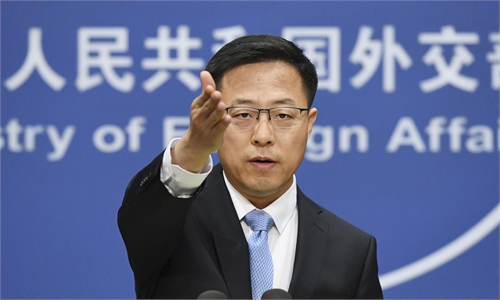COMMENTS / EXPERT ASSESSMENT
Opportunity emerges for China to attract overseas Chinese talent

Some Chinese students celebrate graduation in New York. Photo: IC
With Trump administration's poisonous legacy of visa restrictions on Chinese students still leading the Biden administration on the wrong direction, a new wave of rejections of visa applications emerged recently at the start of summer. After their visa applications were denied, more than 500 Chinese students signed a letter to the Chinese Embassy in the US, which later sparked a wide discussion among Chinese netizens.
Between the US' growing paranoia of being threatened by China's growth and its commitment to break through bottlenecks in technology development caused by the American blockade, Washington's reckless efforts to undermine academic exchanges, regretful as they are, may also be an opportunity for China to enhance preferential policies to attract overseas Chinese talent and speed up the creation of its own talent hub like Silicon Valley.
According to media reports, most of the students whose visa applications were recently rejected are majoring in STEM programs. Some have already enrolled and finished one or two semesters of online courses during the COVID-19 pandemic. About a quarter of them have been granted with scholarships and some are top students who received offers from Harvard, Yale, MIT, Johns Hopkins and other universities.
It is not the first time for the US to batter normal academic and cultural exchanges. In May 2020, Washington reportedly planned to cancel visas for 3,000 Chinese students under the comprehensive guise of security risk.
Even the Chinese who have studied and worked years in the US are facing growing risks of being targeted with baseless accusations.
The unreasonable visa rejection seriously violates the lawful rights and interests of Chinese students. However, with Washington engaging in zero-sum games and trying to promote decoupling campaigns in various sectors, more normal people-to-people exchanges may be obstructed in the future.
As for China, though it has been committed to promote international cooperation, its path of self-reliance is also as crucial as always. After decades of perseverant efforts, both its educational and technological competitiveness have been highly strengthened. Not to mention that many cities in China have established the foundations for favorable technology innovation like Shenzhen, in South China's Guangdong Province. Many leading tech companies are headquartered in the city and under the rapid development of the Guangdong-Hong Kong-Macao Greater Bay Area, joining hands with the special administrative regions will generate an immense synergetic boost for the growth of Shenzhen.
Under such circumstances, China can attract more Chinese talent back and speed up the cultivation of its own talent center by rolling out more and greater preferential policies. There could be tailored policies for experts in specific areas, offering a promising development for Chinese and world talent.
As a matter of fact, though it could be an opportunity for China to attract Chinese and foreign talent under the US' decoupling campaign, the return trend of Chinese talent has already been strengthened for years.
According to data from China's Ministry of Education, 580,300 Chinese students came back to China after graduation in 2019, up 11.73 percent year-on-year. A total of 6.56 million Chinese students went abroad to study between 1978 and 2019 and among the 4.9 million who completed studies, 86.28 percent came back to China to look for professional development in their home country.
The significance of human talent is plain for all to see and the US itself has been benefitting enormously from capturing foreign talent. It is hoped that the US would redress the mistakes in its policy and protect the lawful rights and interests of Chinese students. Chinese people's sincerity to promote cooperation will not disappear, but they will also turn external challenges into opportunities.
The author is an editor with the Global Times. bizopinion@globaltimes.com.cn



